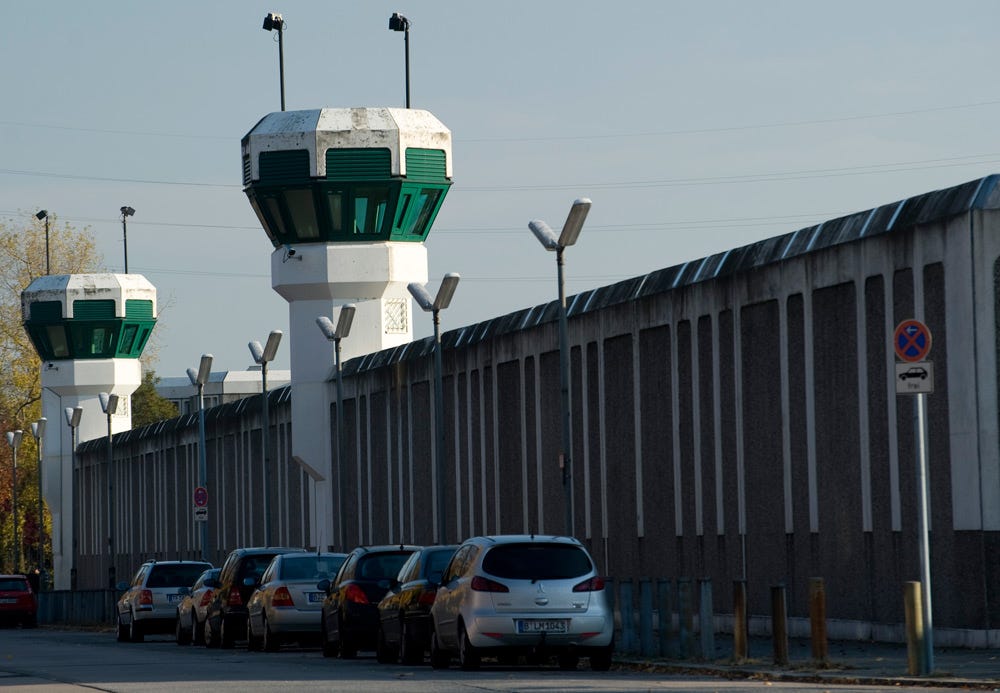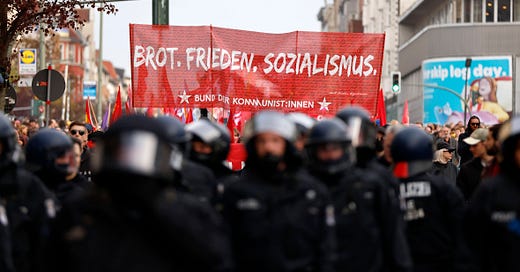#174: "Peaceful" May Day, €49-tix, loo-app
German jails are full of people who rode the train without a ticket
Dear 20 Percent,
May 1 was “surprisingly peaceful” this year, announced Berlin’s top cop Barbara Slowik late Monday night — the “most peaceful since 1987.”
Die Polizei even managed to wind down the famously violent Revolutionäre 1. Mai march at 8pm without any major incidents. A total of nine leftwing protesters were arrested, a tiny number compared to previous years. Apparently, not a single car or bus shelter was set ablaze, though isolated groups were reportedly still chucking bottles at the police on Oranienstraße at 10pm.
Demo-organisers accused the police of creating a dangerous bottleneck around Kottbusser Tor, where the new mini-police station was heavily barricaded and guarded by officers in riot gear. Area radicals consider the cop shop, which opened in February, a provocation.
As my comrade-in-arms Andrew quipped on Twitter, “even Berlin’s protests have been gentrified”. There’s something to that. Already in 2017, while observing the Revolutionäre 1. Mai march from the sidelines — I’m not making this up — I literally overheard someone who appeared to be a real estate broker or investor, tell their client that all the “revolutionary” activity in Kreuzberg was great for property prices. Sadly, virtually every aspect of edgy, political Berlin contributes to the myth-making that property marketers love.
Oh well. Alles hat ein Ende, nur die Wurst hat zwei (everything has an end, only sausage has two). I’d be fine if this particular flavour of aggressive and ultimately counterproductive anti-capitalist demo withered out. But maybe it’s just the lull before the coming storm. Multiple looming international crises don’t suggest more social stability is on the horizon. But at least there was less pointless destruction for one night.
Today (May 2), protest continues in other arenas! Climate-gluers Letzte Generation again blocked roads in 20 places, including the A100 autobahn.
Meanwhile, on Senefelder Platz in Prenzlauer Berg, demonstrators are marking the “Day of the unemployed” in protest of “forced wage work” and in celebration of idleness — but apparently they were too idle to set up a Facebook page or website.
On that note, read on for more news!
Maurice
Support the workaholics that produce this newsletter (“the one newsletter I open,” a famous Berlin podcaster said recently) with a few bucks over at our Patreon.
4-day week?
Berlin’s new labour minister Cansel Kiziltepe (SPD) wants to launch a pilot project where bureaucrats work four-day weeks without a pay cut. As the baby boomers retire, the city will suffer a vast labour shortage and Kiziltepe is hoping to attract more young folks to a career with the state. While studies show that people working four days a week are generally more productive and less stressed, I fear that service could deteriorate even further at Berlin’s Ämter, especially if they continue to frown upon e-mail for reasons of data protection or fail to get their act together when it comes to online services.
Toilet app
I love to harp on about the deficit of free public toilets in Berlin. Okay, some are free now, because it was cheaper to make them free than repairing the ones that were getting broken into for cash. Anyhow, EasyPZ is a new app to help find a loo near you. Great stuff, but the website Gratis Pinkeln has offered this service for years. Maybe the emergence of an app is just generation change in the public bathroom space.
Getir gobbles Flink?
Profit margins in the rapid grocery delivery sector are so low — or actually non-existent — there seems to be a drive towards monopolisation. Following its takeover of Gorillas, Turkish giant Getir is rumoured to be in talks about acquiring Brunnenstraße-based Flink, which, if you believe the Financial Times (paywall), needs €100m to keep the lights on. Only a week ago, Flink said it was cutting 40% of its workforce. In Business Insider’s German-language podcast about the Gorillas fiasco you can learn how both Flink and Gorillas were Getir imitaters — the parent swallowing its offspring.
€49-ticket: botched launch
May 1 was the first day the new €49 Deutschlandticket was valid — the one you can use on local and regional public transport nationwide — and lots of folks waited til yesterday to purchase theirs. Predictably, the Deutsche Bahn server crashed. At Alexanderplatz and Bahnhof Zoo, 100-metre queues formed at ticket counters, according to RBB. And thousands of those prudent souls who bought their Deutschlandtickets from BVG in advance haven’t received their “chip card” in the mail yet. But you can also buy it through the app, though it can take up to 48 hours to be available there.
Factoid

Schwarzfahren aka riding public transport without a valid ticket, is a felony in Germany. The fine is €60, but if you don’t pay the fine in a timely fashion you could eventually rack up a fine as high as €300. If that doesn’t get paid because you simply don’t have the money, you could land behind bars for a month or longer. Every year an estimated 7,000 people end up in the slammer for Schwarzfahren. The current government is working to reform the law (which dates back to 1935, when you-know-who was in power). The English-language podcast Spaßbremse did a great episode on the issue recently, featuring satirist Arne Semsrott of Freiheitsfonds, a fund that pays people’s fines so they can get out of prison.





Awesome factoid. When I found out that the fine in Vienna for no ticket was < 2* the monthly ticket cost (and you only got checked about once a year) I asked why anyone paid, and they looked at me funny and said that the second time you get caught, you go to jail for a year. Wonder who & when THAT law dates back to, could be the same person …